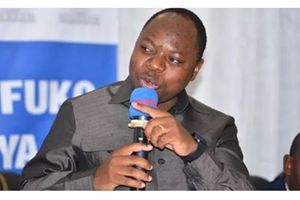In Africa, it’s stubborn faith that gives us hope
What you need to know:
- After that realisation, a cancer begins to grow from the skin inwards; to later metastasize, if not checked in time. This disease, carried on the wind; first whispers, before shouting aloud saying, “It is useless to strive for change.”
- And if one resists the status quo, becoming more defiant of his state, God is thrown into the mix, telling the aggrieved to accept, to obey, “I have ordained it thus…,” presuming God’s collusion in the matter. But is that so? Does the creator ordain some people to be better than others? These questions bring into play one’s choice of gods.
To live within the shadow of a mightier people may cause feelings of doubt and self-loathing. Such effects begin early, when a person sees a difference in the way the world views him, from how he feels inside.
After that realisation, a cancer begins to grow from the skin inwards; to later metastasize, if not checked in time. This disease, carried on the wind; first whispers, before shouting aloud saying, “It is useless to strive for change.”
And if one resists the status quo, becoming more defiant of his state, God is thrown into the mix, telling the aggrieved to accept, to obey, “I have ordained it thus…,” presuming God’s collusion in the matter. But is that so? Does the creator ordain some people to be better than others? These questions bring into play one’s choice of gods.
In an ideal world, all people would choose the God they obey; preferably one, which has the worshipers’ interest at heart: a benevolent, praiseworthy deity.
To some degree, an illusion of that choice exists, speaking in general terms, but given the complexity of human societies, their banal need for worth and relevance makes the choice more complex than it ought to be. Human interaction creates a Ferris-wheel of cyclical displacement of overlords; and with that comes the promotion and demotion of gods.
Historically, that process unfolded in relation to the nations possessing the swiftest horses, strongest swords, or wickedest men. In our time, the sole criterion is based upon those who possess the smartest projectiles.
Yet, in both past and present times, men believe that God supports the conqueror in his demolition of cultures.
And beyond His complicit sanction of murder; God is usually shaped into the image of the male of the triumphant ones: a glorified image of the father. The latter case is more historical; for presently we exist in a post modern world, where humanism has replaced God in our public affairs. The Supreme Being is no longer divine, but human, if even racially stratified.
Annihilation of any people
We regret the annihilation of any people, to the fullest extent; those who for reasons known, have failed to survive the cruel days of conquest: the Indians of the American plains, the Australian Aborigines, The Galyaks of Siberia, those original peoples of Terra del Fuego, the Mayans and Incas, the Aztecs; the native peoples of the West Indies. And most tragic of all, the noble people of Tasmania.
We mourn, with poetic grief, those who have vanished altogether; or have become mere extras in humanity’s march forward, perhaps never to rise again. Time has entombed the dead with their relevant history and consequential humanity.
Amidst the grief, and as the proverbial wheel turns, Africa is rising once more. The continent is becoming central to the globe’s future economic viability, as it had been. Africa has fourteen percent of the world’s population, and thirty percent of its arable land; and with the energy of youth on its side, given its young population, the future seems assured. But what vital things might Africa still lack? Is it conceivable that the missing parts reside within our minds, and are not at all physical? And may we conclude that perhaps there remains a residue of that doctrine of inferiority, which played its part so well across the globe; until those who have risen, defeated it with logic: sound elemental reasoning? May our advancement be hampered by those old ideas, which said we were inept and could not rise above our estate, or even because so many of us have not had the opportunity of obtaining a good education?
With the resurrection of a people, their gods are reborn also. And in Africa’s case, He is the ancient of days; the one true living God of eternal ages. Africa does not have a tradition of unbelief, but one of fervent faith in the divine principle of goodness, truth, and wisdom. And in spite of having passed through the fire; neither our God nor our faith in Him perished. We march towards tomorrow knowing that surely as the sun rises, our faith will be eternal. as the stars.
The writer is the CEO of Grand Africa Literary Initiative Ltd




